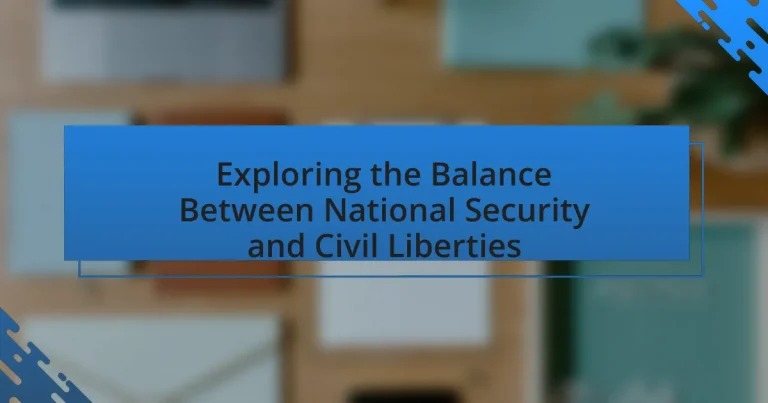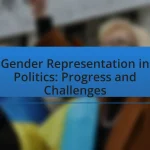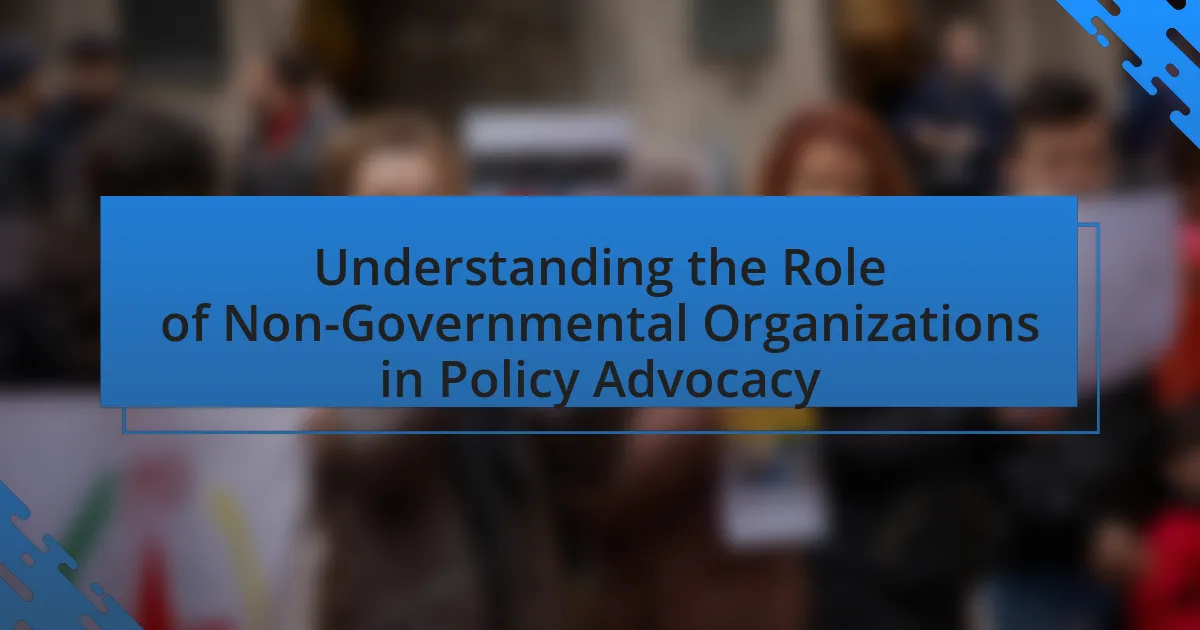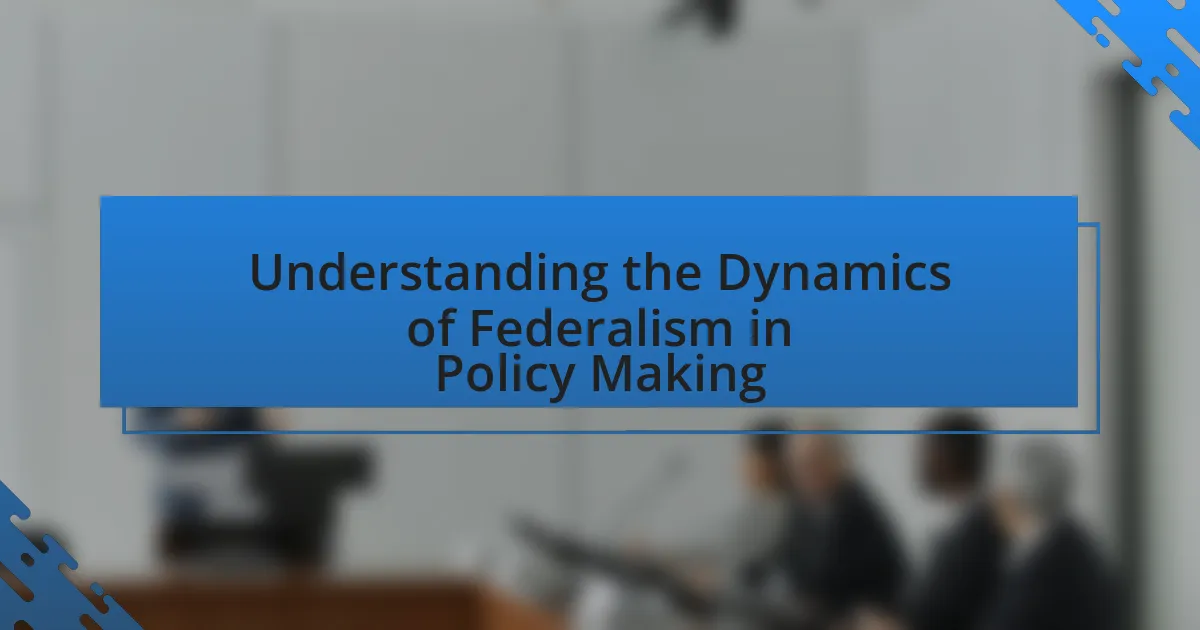The article examines the critical balance between national security and civil liberties, emphasizing the need to protect citizens while safeguarding individual rights. It discusses historical events that have shaped this balance, such as the USA PATRIOT Act and the internment of Japanese Americans during World War II, illustrating how security measures can infringe upon civil liberties. The article also explores different countries’ approaches to this balance, key legal frameworks, and the role of public opinion and the judiciary in shaping policies. Additionally, it highlights the challenges and implications of overstepping this balance, advocating for best practices to ensure both security and the protection of civil liberties.
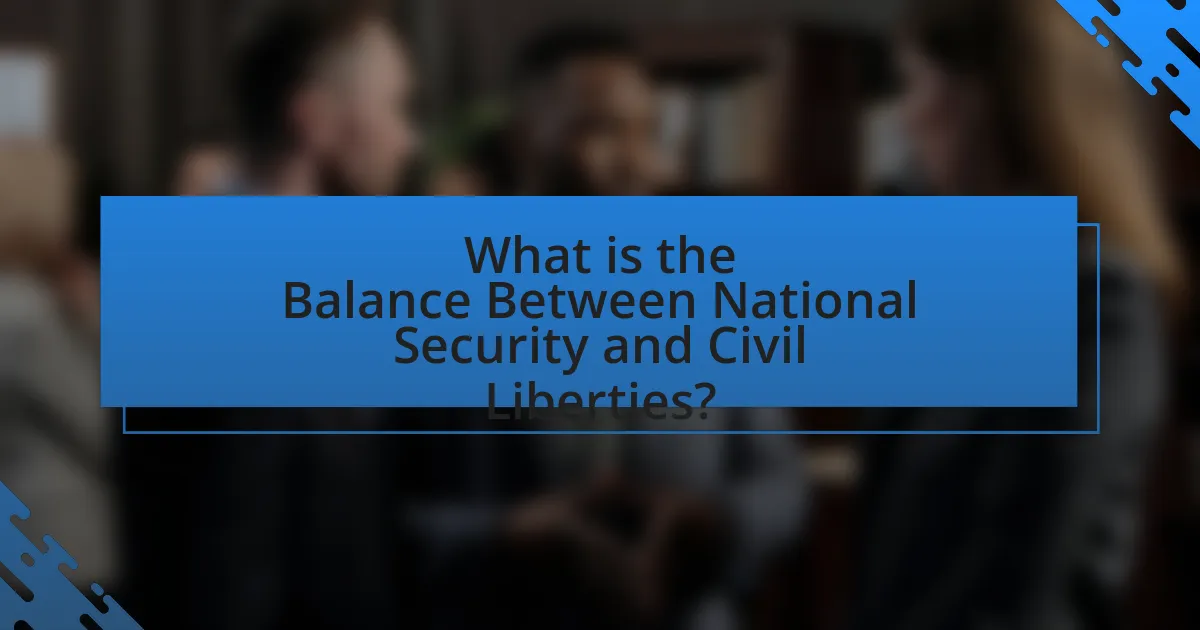
What is the Balance Between National Security and Civil Liberties?
The balance between national security and civil liberties involves ensuring the protection of a nation’s citizens while safeguarding individual rights and freedoms. National security measures, such as surveillance and intelligence gathering, are often justified by the need to prevent threats, as seen in the USA PATRIOT Act enacted after the September 11 attacks, which expanded government powers to monitor communications. However, these measures can infringe upon civil liberties, including privacy rights and freedom of expression, leading to debates about the extent and limits of government authority. Historical instances, such as the internment of Japanese Americans during World War II, illustrate the potential for civil liberties to be compromised in the name of national security. Balancing these interests requires ongoing dialogue and legal frameworks that protect both security and individual rights.
Why is the balance between national security and civil liberties important?
The balance between national security and civil liberties is important because it ensures the protection of individual rights while maintaining the safety of the state. When national security measures infringe upon civil liberties, it can lead to government overreach and the erosion of democratic freedoms, as evidenced by historical instances such as the USA PATRIOT Act, which expanded surveillance capabilities at the expense of privacy rights. Conversely, prioritizing civil liberties without regard for national security can leave a nation vulnerable to threats, as seen in the aftermath of events like the September 11 attacks, where lapses in security allowed for significant harm. Therefore, a careful equilibrium is essential to uphold both the safety of citizens and the fundamental rights that define a democratic society.
What historical events have shaped this balance?
The balance between national security and civil liberties has been shaped by several historical events, notably the American Civil War, World War I, World War II, and the post-9/11 era. During the American Civil War, President Abraham Lincoln suspended habeas corpus, prioritizing national security over civil liberties in response to rebellion. In World War I, the Espionage Act of 1917 and the Sedition Act of 1918 restricted free speech to protect national interests. World War II saw the internment of Japanese Americans, reflecting a significant compromise of civil liberties for perceived security threats. Following the September 11 attacks in 2001, the USA PATRIOT Act expanded government surveillance capabilities, further illustrating the ongoing tension between ensuring national security and protecting individual rights. These events collectively demonstrate how crises have historically led to the prioritization of security measures at the expense of civil liberties.
How do different countries approach this balance?
Different countries approach the balance between national security and civil liberties through varying legal frameworks and policies. For instance, the United States emphasizes individual rights through the Constitution, often requiring judicial oversight for surveillance activities, as seen in the Foreign Intelligence Surveillance Act (FISA). In contrast, the United Kingdom employs a more centralized approach, utilizing the Investigatory Powers Act, which grants extensive surveillance capabilities to security agencies, often with less public scrutiny. Additionally, countries like Germany prioritize civil liberties, reflecting on historical contexts, such as the legacy of the Stasi, leading to stringent data protection laws. These differences illustrate how national security measures are shaped by cultural, historical, and legal factors unique to each country.
What are the key concepts related to national security and civil liberties?
Key concepts related to national security and civil liberties include the tension between government surveillance and individual privacy rights, the necessity of protecting citizens from threats while upholding constitutional freedoms, and the legal frameworks that govern these interactions, such as the USA PATRIOT Act. National security aims to safeguard a nation from external and internal threats, often leading to policies that may infringe on civil liberties, such as freedom of speech and due process. Historical events, like the post-9/11 security measures, illustrate how national security concerns can lead to increased surveillance and reduced privacy, raising debates about the appropriate balance between safety and individual rights.
What defines national security in a democratic society?
National security in a democratic society is defined by the protection of the state and its citizens from external and internal threats while upholding democratic values and civil liberties. This balance is crucial, as it ensures that measures taken to safeguard the nation do not infringe upon individual rights and freedoms. For instance, the U.S. Constitution emphasizes the importance of civil liberties, which must be preserved even in the face of security challenges, as seen in landmark Supreme Court cases like Korematsu v. United States, which highlighted the tension between national security and civil rights.
How are civil liberties protected under the law?
Civil liberties are protected under the law primarily through constitutional provisions, statutory laws, and judicial interpretations. In the United States, the Bill of Rights, which comprises the first ten amendments to the Constitution, explicitly safeguards individual freedoms such as speech, religion, and assembly. Additionally, landmark Supreme Court cases, such as Miranda v. Arizona, have established legal precedents that reinforce the protection of civil liberties by ensuring individuals are informed of their rights during police interrogations. Statutory laws, like the Civil Rights Act, further enhance these protections by prohibiting discrimination and safeguarding individuals from governmental overreach.
What challenges arise in maintaining this balance?
Maintaining the balance between national security and civil liberties presents significant challenges, primarily due to the potential for overreach in surveillance and law enforcement practices. The government may prioritize security measures that infringe on individual rights, leading to violations of privacy and freedom of expression. For instance, the USA PATRIOT Act, enacted after the September 11 attacks, expanded surveillance capabilities, raising concerns about the erosion of civil liberties. Additionally, public fear of terrorism can create pressure to adopt more invasive security measures, often at the expense of due process and accountability. These challenges highlight the ongoing tension between ensuring safety and protecting fundamental rights in democratic societies.
How do security threats impact civil liberties?
Security threats often lead to the erosion of civil liberties as governments implement measures aimed at protecting national security. For instance, following the September 11 attacks in 2001, the USA PATRIOT Act was enacted, which expanded surveillance capabilities and reduced privacy protections for individuals. This legislation allowed for increased monitoring of communications and financial transactions, demonstrating how perceived threats can justify the limitation of personal freedoms. Additionally, studies have shown that in times of heightened security concerns, public support for measures that infringe on civil liberties, such as warrantless searches and detention without trial, tends to increase, further illustrating the impact of security threats on civil liberties.
What role does public opinion play in shaping policies?
Public opinion significantly influences policy formation by reflecting the collective preferences and values of the populace. Policymakers often consider public sentiment to ensure that their decisions align with the electorate’s views, particularly in democratic societies where public support is crucial for political survival. For instance, during the post-9/11 era, public concern over national security led to the implementation of policies like the USA PATRIOT Act, which expanded surveillance capabilities. This demonstrates how public opinion can drive legislative action, especially when national security is perceived to be at risk.
How can we assess the effectiveness of policies related to this balance?
To assess the effectiveness of policies related to the balance between national security and civil liberties, one can utilize a combination of quantitative metrics and qualitative evaluations. Quantitative metrics may include statistical analysis of crime rates, incidents of terrorism, or civil rights violations before and after policy implementation, providing measurable outcomes of policy impact. Qualitative evaluations can involve public opinion surveys and expert assessments to gauge perceptions of security and freedom, reflecting societal attitudes towards the policies in question. For instance, the USA PATRIOT Act’s impact has been analyzed through studies that show a correlation between its enactment and both increased surveillance capabilities and public concern over privacy rights, illustrating the dual effects of such policies.
What are the implications of overstepping this balance?
Overstepping the balance between national security and civil liberties can lead to significant violations of individual rights and freedoms. When governments prioritize security measures excessively, they may implement surveillance programs that infringe on privacy, restrict freedom of expression, and curtail due process rights. Historical examples, such as the USA PATRIOT Act enacted after the September 11 attacks, illustrate how expanded surveillance powers can result in widespread monitoring of citizens, often without sufficient oversight or accountability. This imbalance can foster distrust in government institutions, provoke civil unrest, and undermine democratic principles, as seen in various protests against perceived overreach in countries like the United States and the United Kingdom.
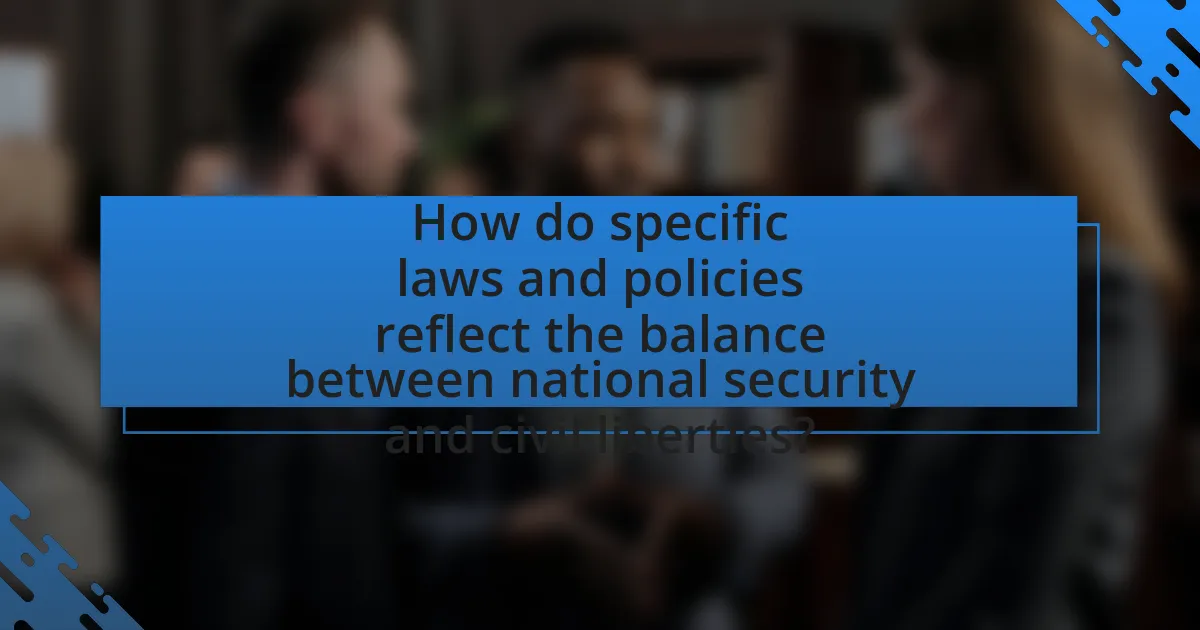
How do specific laws and policies reflect the balance between national security and civil liberties?
Specific laws and policies reflect the balance between national security and civil liberties by establishing frameworks that prioritize security while imposing limitations on governmental power to protect individual rights. For example, the USA PATRIOT Act, enacted after the September 11 attacks, expanded surveillance capabilities to enhance national security but also included provisions for oversight and sunset clauses to safeguard civil liberties. Additionally, the Foreign Intelligence Surveillance Act (FISA) allows for surveillance of foreign entities while requiring judicial approval, thus attempting to balance security needs with privacy rights. These laws illustrate the ongoing negotiation between ensuring safety and preserving fundamental freedoms, as evidenced by court rulings that have challenged or upheld various provisions based on their impact on civil liberties.
What are some key laws that impact this balance?
Key laws that impact the balance between national security and civil liberties include the USA PATRIOT Act, the Foreign Intelligence Surveillance Act (FISA), and the National Security Agency’s (NSA) surveillance programs. The USA PATRIOT Act, enacted in 2001, expanded the government’s surveillance capabilities to prevent terrorism, allowing for increased monitoring of communications and financial transactions. FISA, originally passed in 1978 and amended multiple times, governs the collection of foreign intelligence information and has been criticized for its implications on privacy rights. Additionally, NSA surveillance programs, revealed by Edward Snowden in 2013, highlighted the extent of data collection on individuals, raising significant concerns about civil liberties in the context of national security efforts.
How does the USA PATRIOT Act affect civil liberties?
The USA PATRIOT Act significantly affects civil liberties by expanding government surveillance capabilities and reducing checks on law enforcement. This legislation allows for increased monitoring of communications, including phone and internet usage, without a warrant in many cases, which raises concerns about privacy rights. For instance, Section 215 permits the FBI to obtain business records, including library and medical records, under the premise of national security, thereby infringing on individuals’ rights to privacy and freedom of expression. Critics argue that these measures create a chilling effect on free speech and association, as individuals may fear surveillance when engaging in lawful activities.
What are the implications of the Foreign Intelligence Surveillance Act?
The implications of the Foreign Intelligence Surveillance Act (FISA) primarily involve the balance between national security and civil liberties. FISA allows the U.S. government to conduct surveillance on foreign entities and, under certain conditions, domestic individuals suspected of being involved in foreign intelligence activities. This surveillance can lead to enhanced national security by enabling the government to detect and prevent potential threats, as evidenced by its use in counterterrorism efforts post-9/11. However, FISA also raises significant concerns regarding privacy rights and civil liberties, as it permits warrantless surveillance under specific circumstances, which critics argue can lead to abuse and overreach. The act’s provisions have been challenged in courts, highlighting ongoing debates about the extent of government surveillance and its impact on individual freedoms.
How do recent events influence legislation regarding this balance?
Recent events significantly influence legislation regarding the balance between national security and civil liberties by prompting lawmakers to reassess existing laws and introduce new measures. For instance, the rise in domestic terrorism and cyber threats has led to increased scrutiny of surveillance practices, resulting in legislative proposals aimed at enhancing security while addressing privacy concerns. The USA PATRIOT Act, enacted after the September 11 attacks, exemplifies how immediate threats can lead to expansive security measures, often at the expense of civil liberties. Additionally, public outcry over government surveillance programs, revealed by whistleblowers, has spurred legislative efforts to impose stricter oversight and accountability on intelligence agencies, reflecting a growing demand for a balance that protects both security interests and individual rights.
What lessons were learned from the COVID-19 pandemic regarding civil liberties?
The COVID-19 pandemic highlighted the tension between public health measures and civil liberties, revealing that emergency powers can lead to significant restrictions on individual freedoms. Governments implemented lockdowns, mandated mask-wearing, and enforced social distancing, often without clear legal frameworks, which raised concerns about overreach and the potential for abuse of power. For instance, in many countries, surveillance measures increased to track virus spread, prompting debates about privacy rights and data protection. These actions underscored the necessity for transparent governance and the importance of legal safeguards to protect civil liberties during emergencies, as seen in various legal challenges against government mandates that questioned their constitutionality.
How have recent terrorist attacks shaped national security policies?
Recent terrorist attacks have significantly influenced national security policies by prompting governments to enhance surveillance measures and increase funding for counter-terrorism initiatives. For instance, following the 2015 Paris attacks, France implemented the Surveillance Law, which expanded police powers to monitor communications and conduct searches without warrants. Additionally, the 9/11 attacks led to the establishment of the Department of Homeland Security in the United States, which centralized efforts to prevent terrorism and protect critical infrastructure. These changes reflect a trend towards prioritizing security over civil liberties, as seen in the increased use of data collection and monitoring technologies, often justified by the need to prevent future attacks.
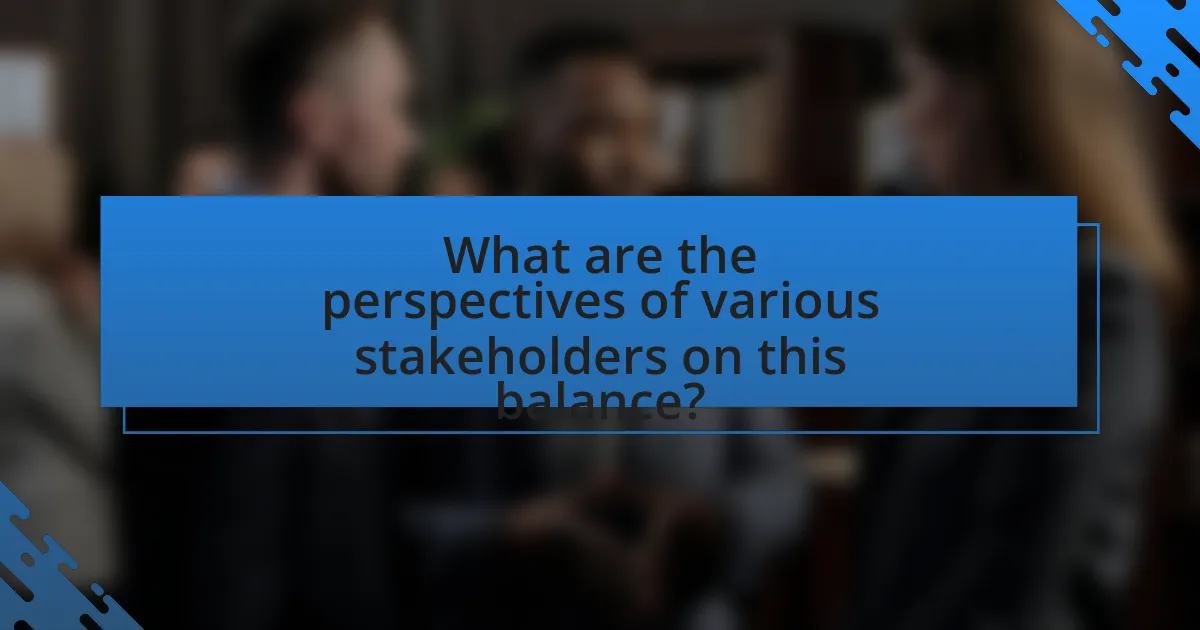
What are the perspectives of various stakeholders on this balance?
Various stakeholders, including government officials, civil rights organizations, and the general public, hold differing perspectives on the balance between national security and civil liberties. Government officials often prioritize national security, arguing that surveillance and data collection are essential for preventing terrorism and protecting citizens. For instance, the USA PATRIOT Act, enacted after the September 11 attacks, reflects this viewpoint by expanding law enforcement’s surveillance capabilities.
In contrast, civil rights organizations advocate for the protection of civil liberties, emphasizing that excessive surveillance can lead to violations of privacy and freedom of expression. The American Civil Liberties Union (ACLU) has consistently challenged policies that they believe infringe on individual rights, citing cases where surveillance disproportionately affects marginalized communities.
The general public’s perspective is mixed, with some individuals supporting increased security measures for safety, while others express concern over potential overreach and loss of personal freedoms. Surveys indicate that public opinion fluctuates based on recent events, such as terrorist attacks, which can temporarily shift priorities towards security over civil liberties.
How do civil rights organizations view national security measures?
Civil rights organizations generally view national security measures with skepticism, often arguing that such measures can infringe upon individual liberties and civil rights. For instance, organizations like the American Civil Liberties Union (ACLU) have raised concerns that policies enacted in the name of national security, such as mass surveillance and racial profiling, disproportionately affect marginalized communities and violate constitutional protections. These organizations advocate for a careful balance between ensuring national security and protecting civil liberties, emphasizing that security should not come at the expense of fundamental rights.
What arguments do they present against certain security policies?
Critics argue against certain security policies by highlighting their potential to infringe on civil liberties and privacy rights. For instance, policies that involve mass surveillance can lead to unwarranted monitoring of individuals, violating the Fourth Amendment rights against unreasonable searches. Additionally, opponents point out that such policies often lack transparency and accountability, which can result in abuse of power by authorities. Research by the American Civil Liberties Union indicates that overreach in security measures can disproportionately target marginalized communities, exacerbating social inequalities. These arguments emphasize the need for a careful balance between ensuring national security and protecting individual freedoms.
How do they advocate for the protection of civil liberties?
Advocacy for the protection of civil liberties occurs through legal challenges, public awareness campaigns, and legislative efforts. Organizations such as the American Civil Liberties Union (ACLU) actively file lawsuits to contest laws and practices that infringe on individual rights, exemplified by their involvement in cases like Brown v. Board of Education, which addressed racial segregation. Additionally, they conduct educational initiatives to inform the public about civil rights issues, utilizing reports and media outreach to highlight threats to liberties, such as government surveillance programs revealed by whistleblowers. Legislative advocacy is also crucial, as these organizations lobby for laws that safeguard freedoms, such as the USA Freedom Act, which aimed to limit government surveillance.
What is the government’s perspective on national security versus civil liberties?
The government generally prioritizes national security over civil liberties, especially in times of perceived threats. This perspective is often justified by the need to protect citizens from terrorism and other dangers, leading to policies that may limit certain freedoms, such as surveillance measures enacted post-9/11. For instance, the USA PATRIOT Act expanded government surveillance capabilities, reflecting a shift towards prioritizing security. This approach is supported by the belief that a secure nation is essential for the exercise of civil liberties, although it raises ongoing debates about the extent to which civil liberties should be compromised for security.
How do government officials justify security measures?
Government officials justify security measures primarily by citing the need to protect national security and public safety. They argue that these measures are essential to prevent threats such as terrorism, cyberattacks, and other forms of violence that could endanger citizens. For instance, after the September 11 attacks, the U.S. government implemented the USA PATRIOT Act, which expanded surveillance capabilities to enhance national security. Officials often reference statistical data showing a correlation between increased security measures and a reduction in crime rates or successful prevention of attacks, thereby reinforcing their stance that such measures are necessary for the safety of the populace.
What are the potential risks of prioritizing civil liberties over security?
Prioritizing civil liberties over security can lead to increased vulnerability to threats such as terrorism and crime. When civil liberties are emphasized, law enforcement may face limitations in surveillance and intelligence-gathering, which can hinder their ability to prevent attacks. For instance, the 9/11 attacks highlighted how lapses in security protocols, influenced by a strong focus on civil liberties, allowed terrorists to exploit weaknesses in national defenses. Additionally, prioritizing civil liberties may result in a lack of necessary resources for security agencies, potentially leading to inadequate responses to emerging threats.
What role does the judiciary play in this balance?
The judiciary serves as a critical check on the balance between national security and civil liberties by interpreting laws and ensuring that government actions comply with constitutional protections. Courts evaluate the legality of government measures aimed at enhancing national security, such as surveillance programs, against the rights guaranteed to individuals, such as privacy and freedom of expression. For instance, landmark cases like United States v. United States District Court (1972) established that the government must demonstrate a compelling interest when infringing on civil liberties, thereby reinforcing the judiciary’s role in safeguarding individual rights while allowing for necessary security measures.
How have courts interpreted laws affecting national security and civil liberties?
Courts have interpreted laws affecting national security and civil liberties by balancing governmental interests in security with individual rights. For instance, in cases like Korematsu v. United States (1944), the Supreme Court upheld the internment of Japanese Americans during World War II, prioritizing national security over civil liberties, although this decision has been widely criticized and later denounced. Conversely, in more recent rulings, such as United States v. Jones (2012), the Supreme Court recognized the importance of privacy rights in the context of law enforcement surveillance, indicating a shift towards protecting civil liberties even in national security matters. These interpretations reflect an ongoing judicial effort to navigate the complex relationship between safeguarding the nation and upholding constitutional rights.
What landmark cases have influenced this balance?
Landmark cases that have influenced the balance between national security and civil liberties include Schenck v. United States (1919), which established the “clear and present danger” test for limiting free speech, and Korematsu v. United States (1944), which upheld the internment of Japanese Americans during World War II, prioritizing national security over individual rights. Additionally, the case of United States v. Nixon (1974) reinforced the principle that no one, including the president, is above the law, thereby protecting civil liberties against governmental overreach. These cases collectively illustrate the ongoing tension and legal precedents that shape the discourse on national security and civil liberties.
What best practices can be adopted to maintain this balance effectively?
To maintain the balance between national security and civil liberties effectively, implementing transparent oversight mechanisms is essential. These mechanisms, such as independent review boards and regular audits, ensure that security measures do not infringe upon individual rights. For instance, the USA PATRIOT Act has faced scrutiny, leading to reforms that emphasize accountability and civil rights protections. Additionally, fostering public dialogue about security policies can enhance trust and understanding, as seen in countries that engage citizens in discussions about surveillance practices. These practices collectively contribute to a more balanced approach, safeguarding both national security and civil liberties.
